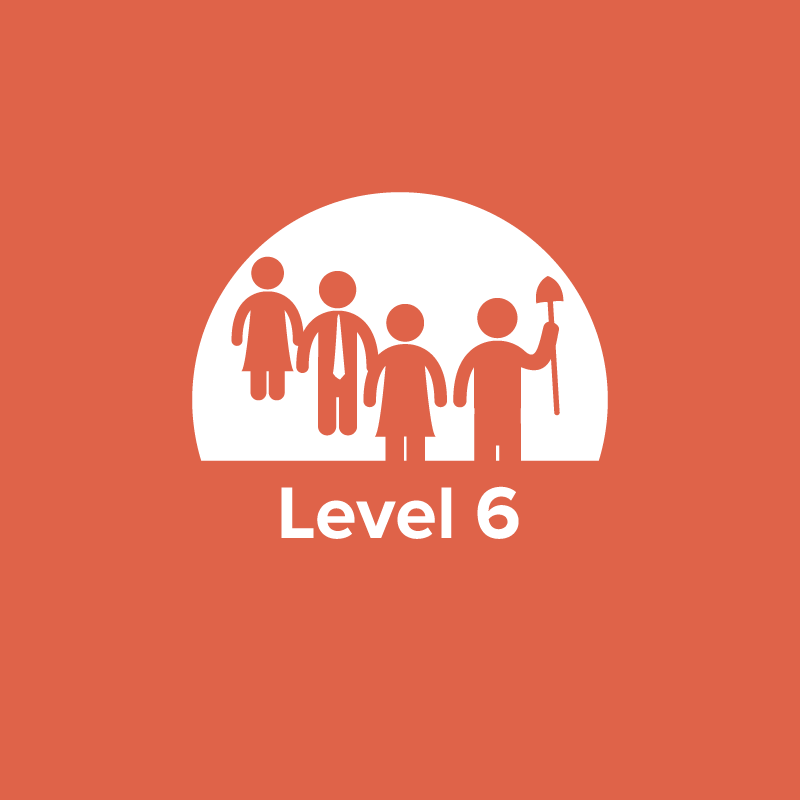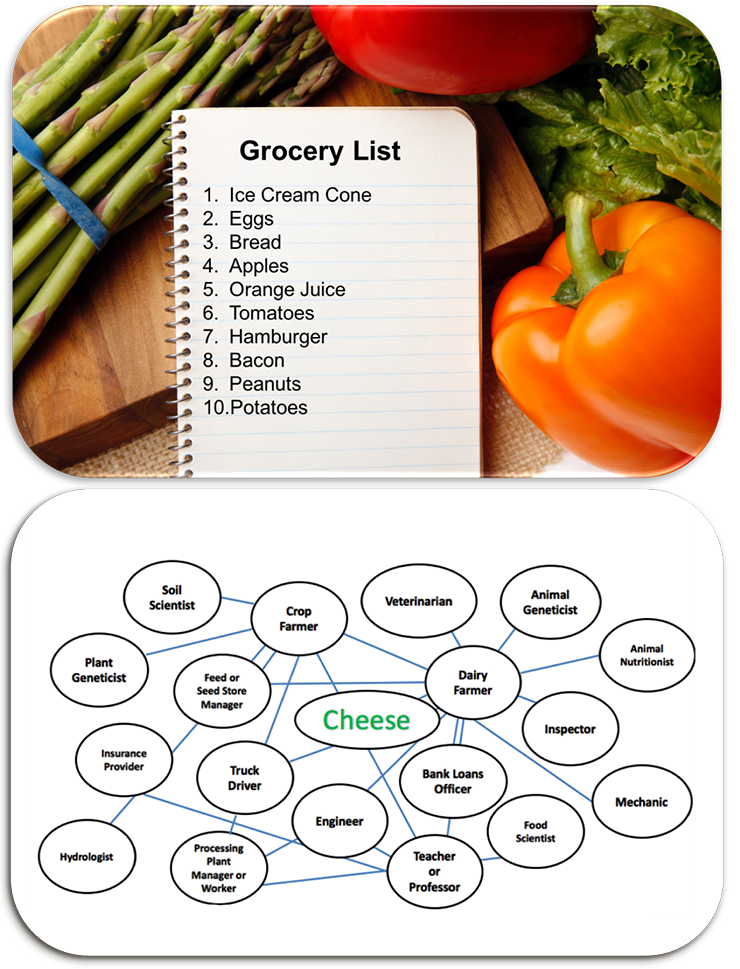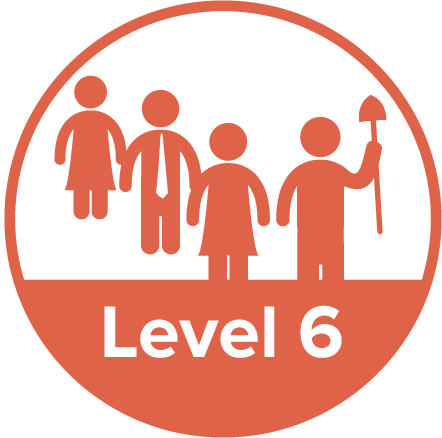Journey 2050 Lesson 6: Careers (Grades 9-12)
Students will explore careers related to agriculture, identify personal interests within agriculture or a related field and discuss how agricultural professionals can impact world food.

Background
Lesson Activities
Recommended Companion Resources
Credits
Author
Lindsey Verhaeghe, Andrea Gardner, Debra Spielmaker, and Sara Hunt | National Center for Agricultural Literacy (NCAL) and Nutrien
Acknowledgements
The Journey 2050 program was originally developed by Nutrien in collaboration with Calgary Stampede, Alberta Canola Producers Commission, Nutrients for Life Foundation, and Agriculture in the Classroom Canada. Authors and contributors were drawn from each of these organizations under the direction of Lindsey Verhaeghe (Nutrien) and Robyn Kurbel (Calgary Stampede.) The lessons were updated and revised in 2017 and 2022 with contributions from the original J2050 Steering Committee, the National Center for Agricultural Literacy, and the National Agriculture in the Classroom Organization.
Sources
- https://www.agrivi.com/blog/employment-in-agriculture/
- http://www.fb.org/newsroom/fast-facts
- https://www.ers.usda.gov/data-products/chart-gallery/gallery/chart-detail/?chartId=58282
- https://www.agr.gc.ca/resources/prod/doc/info/pdf/aafc-aac_brochure_mar2013_eng.pdf
- http://www.fao.org/docrep/013/am307e/am307e00.pdf
- https://growinganation.org/
- https://www.ers.usda.gov/data-products/ag-and-food-statistics-charting-the-essentials/ag-and-food-sectors-and-the-economy.aspx
Standards
Texas Content Area Standards
-
Career Preparation I: 127.14.c.1
The student demonstrates professional employability skills to gain an entry-level position.
- Career Preparation I: 1.A: The student is expected to identify employment opportunities.
-
Principles of Agriculture, Food, and Natural Resources: 130.2.c.1
The student demonstrates professional standards/employability skills as required by business and industry. The student is expected to:
- Principles of Agriculture, Food, and Natural Resources: 130.2.c.1.A: identify career development, education, and entrepreneurship opportunities in the field of agriculture, food, and natural resources.
- Principles of Agriculture, Food, and Natural Resources: 130.2.c.1.B: apply competencies related to resources, information, interpersonal skills, problem solving, critical thinking, and systems of operation in agriculture, food, and natural resources.
-
Principles of Agriculture, Food, and Natural Resources: 130.2.c.4
The student explains the historical, current, and future significance of the agriculture, food, and natural resources industry. The student is expected to:
- Principles of Agriculture, Food, and Natural Resources: 130.2.c.4.B: analyze the scope of agriculture, food, and natural resources and its effect upon society.
-
Principles of Agriculture, Food, and Natural Resources: 130.2.c.6
The student demonstrates appropriate personal and communication skills. The student is expected to:
- Principles of Agriculture, Food, and Natural Resources: 130.2.c.6.A: demonstrate written and oral communication skills appropriate for formal and informal situations such as prepared and extemporaneous presentations.
- Principles of Agriculture, Food, and Natural Resources: 130.2.c.6.B: demonstrate effective listening skills appropriate for formal and informal situations.
-
Career and College Exploration: 127.2.d.8
The student creates an individual career and academic plan. The student is expected to:
- Career and College Exploration: 127.2.d.8.A: select a career pathway in a desired field, such as military service, entrepreneurship, or industry.
-
Professional Standards in Agribusiness: 130.3.c.1
The student demonstrates professional standards/employability skills as required by business and industry. The student is expected to:
- Professional Standards in Agribusiness: 130.3.c.1.F: research career topics using technology such as the Internet.
-
Agribusiness Management and Marketing: 130.4.c.1
The student demonstrates professional standards/employability skills as required by business and industry. The student is expected to:
- Agribusiness Management and Marketing: 130.4.c.1.F: research career topics using technology such as the Internet.
- Mathematical Applications in Agriculture, Food, and Natural Resources: 130.5.c.1.F: research career topics using technology such as the Internet.
-
Equine Science: 130.6.c.1
The student demonstrates professional standards/employability skills as required by business and industry. The student is expected to:
- Equine Science: 130.6.c.1.F: research career topics using technology such as the Internet.
-
Livestock Production: 130.7.c.1
The student demonstrates professional standards/employability skills as required by business and industry The student is expected to:
- Livestock Production: 130.7.c.1.F: research career topics using technology such as the Internet.
-
English I: 110.36.c.1
Developing and sustaining foundational language skills: listening, speaking, discussion, and thinking--oral language. The student develops oral language through listening, speaking, and discussion.
- English I: 1.A: The student is expected to engage in meaningful and respectful discourse by listening actively, responding appropriately, and adjusting communication to audiences and purposes.
- English I: 1.C: The student is expected to give a presentation using informal, formal, and technical language effectively to meet the needs of audience, purpose, and occasion, employing eye contact, speaking rate such as pauses for effect, volume, enunciation, purposeful gestures, and conventions of language to communicate ideas effectively.
- English I: 1.D: The student is expected to participate collaboratively, building on the ideas of others, contributing relevant information, developing a plan for consensus building, and setting ground rules for decision making.
-
English II: 110.37.c.1
Developing and sustaining foundation language skills: listening, speaking, discussion, and thinking--oral language. The student develops oral language through listening, speaking, and discussion.
- English II: 1.A: The student is expected to engage in meaningful and respectful discourse by listening actively, responding appropriately, and adjusting communication to audiences and purposes.
- English II: 1.C: The student is expected to give a formal presentation that incorporates a clear thesis and a logical progression of valid evidence from reliable sources and that employs eye contact, speaking rate such as pauses for effect, volume, enunciation, purposeful gestures, and conventions of language to communicate ideas effectively.
- English II: 1.D: The student is expected to participate collaboratively, building on the ideas of others, contributing relevant information, developing a plan for consensus building, and setting ground rules for decision making.
-
English III: 110.38.c.1
Developing and sustaining foundational language skills: listening, speaking, discussion, and thinking--oral language. The student develops oral language through listening, speaking, and discussion.
- English III: 1.A: The student is expected to engage in meaningful and respectful discourse when evaluating the clarity and coherence of a speaker's message and critiquing the impact of a speaker's use of diction and syntax.
- English III: 1.C: The student is expected to give a formal presentation that exhibits a logical structure, smooth transitions, accurate evidence, well-chosen details, and rhetorical devices and that employs eye contact, speaking rate such as pauses for effect, volume, enunciation, purposeful gestures, and conventions of language to communicate ideas effectively.
- English III: 1.D: The student is expected to participate collaboratively, offering ideas or judgements that are purposeful in moving the team toward goals, asking relevant and insightful questions, tolerating a range of positions and ambiguity in decision making, and evaluating the work of the group based on agreed-upon criteria.
-
Small Animal Management: 130.8.c.1
The student demonstrates professional standards/employability skills as required by business and industry. The student is expected to:
- Small Animal Management: 130.8.c.1.F: research career topics using technology such as the Internet.
-
English IV: 110.39.c.1
Developing and sustaining foundational language skills: listening, speaking, discussion, and thinking--oral language. The student develops oral language through listening, speaking, and discussion.
- English IV: 1.A: The student is expected to engage in meaningful and respectful discourse when evaluating the clarity and coherence of a speaker's message and critiquing the impact of a speaker's use of diction, syntax, and rhetorical strategies.
- English IV: 1.D: The student is expected to participate collaboratively, offering ideas or judgements that are purposeful in moving the team toward goals, asking relevant and insightful questions, tolerating a range of positions and ambiguity in decision making, and evaluating the work of the group based on agreed-upon criteria.
-
Veterinary Medical Applications: 130.9.c.1
The student demonstrates professional standards/employability skills as required by business and industry. The student is expected to:
- Veterinary Medical Applications: 130.9.c.1.F: research career topics using technology such as the Internet.
-
Advanced Animal Science: 130.10.c.1
The student demonstrates professional standards/employability skills as required by business and industry. The student is expected to:
- Advanced Animal Science: 130.10.c.1.F: research career topics using technology such as the Internet.
-
Environmental Systems: 112.37.c.3
Scientific process. The student uses critical thinking, scientific reasoning, and problem solving to make informed decisions within and outside the classroom.
- Environmental Systems: 3.E: The student is expected to describe the connection between environmental science and future careers.
-
English I: 110.36.c.10
Composition: listening, speaking, reading, writing, and thinking using multiple texts -- genres. The student uses genre characteristics and craft to compose multiple texts that are meaningful.
- English I: 10.B: The student is expected to compose informational texts such as explanatory essays, reports, and personal essays using genre characteristics and craft.
-
English II: 110.37.c.10
Composition: listening, speaking, reading, writing, and thinking using multiple texts -- genres. The student uses genre characteristics and craft to compose multiple texts that are meaningful.
- English II: 10.B: The student is expected to compose informational texts such as explanatory essays, reports, and personal essays using genre characteristics and craft.
-
English III: 110.38.c.10
Composition: listening, speaking, reading, writing, and thinking using multiple texts -- genres. The student uses genre characteristics and craft to compose multiple texts that are meaningful.
- English III: 10.B: The student is expected to compose informational texts such as explanatory essays, reports, resumes, and personal essays using genre characteristics and craft.
-
English IV: 110.39.c.10
Composition: listening, speaking, reading, writing, and thinking using multiple texts -- genres. The student uses genre characteristics and craft to compose multiple texts that are meaningful.
- English IV: 10.B: The student is expected to compose informational texts such as explanatory essays, reports, resumes, and personal essays using genre characteristics and craft.
-
Food Technology and Safety: 130.15.c.1
The student demonstrates professional standards/employability skills as required by business and industry. The student is expected to:
- Food Technology and Safety: 130.15.c.1.F: research career topics using technology such as the Internet.
-
Food Processing: 130.16.c.1
The student demonstrates professional standards/employability skills as required by business and industry. The student is expected to:
- Food Processing: 130.16.c.1.F: research career topics using technology such as the Internet.

 Preparation: Prior to class, review the Background information, and slide deck associated with the lesson. Review the
Preparation: Prior to class, review the Background information, and slide deck associated with the lesson. Review the 
 Slide 4: Open the Career Game Level 6 on each student’s computer or device. Explain the following:
Slide 4: Open the Career Game Level 6 on each student’s computer or device. Explain the following: